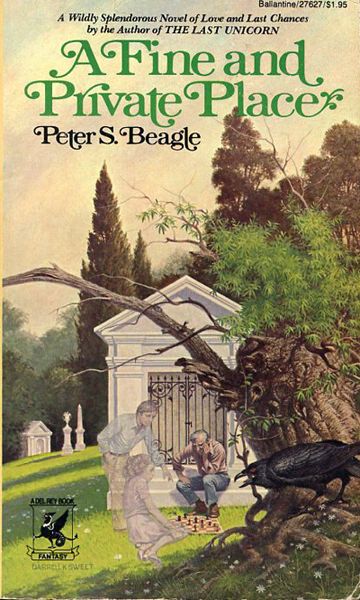No Remedy for Memory
A Fine and Private Place
By Peter S. Beagle

14 Mar, 2021
Peter S. Beagle’s 1960 A Fine and Private Place is a standalone modern fantasy.
To paraphrase Dickens, Michael Morgan was dead. There is no doubt whatever about that. The register of his burial was signed by the appropriate authorities. Michael was as dead as a door-nail.
But Michael Morgan was not quite gone.
His corpse is interred in Yorkchester Cemetery. His ghost went along for the ride, tethered (by forces he did not comprehend) to his mortal shell. With a little practice, Michael could wander from his corpse’s location … but not too far. Ghosts have many limitations; having to remain in the vicinity of their former fleshy abode is a big one.
Jonathan Rebeck calls one of the crypts in the cemetery home. Unlike the vast majority of the cemetery’s long-term residents, Jonathan is still alive. He took refuge in the cemetery following a mental crisis and has lived there for almost twenty years. Good thing for Jonathan that he can speak to ghosts or he would have very little company.
Jonathan informs Michael about how things work now that he’s dead. Perhaps the most important fact about the new normal is that ghosts are surprisingly transitory. The dead soon lose all of the memories that tie them to their former lives. Most ghosts fade away into shadows within a month of dying. Unwelcome news, particularly since Michael died comparatively young, thanks to his homicidal wife.
Laura is a young woman who did very little with her life before being run over by truck-kun1. Where Michael clings to his memories of life, Laura is more willing to explore the possibilities that being a ghost offers her. Ironically, her memories of life seem to be clearer than Michael’s. He seems to have spent more time lecturing people about life than experiencing it.
Laura and Michael become close companions. It soon becomes clear that the two have fallen in love with each other. They find their inability to touch extremely frustrating, but this does not force them apart. If anything, the shared frustration brings them closer together. Perhaps as a side effect of their relationship, both ghosts persist for a very long time.
It is a pity, therefore, that events are conspiring to separate them forever.
~oOo~
The title references Andrew Marvell’s “To His Coy Mistress,” a poem which has over the years provided a number of authors with material from which to draw titles.
The Grave’s a fine and private place,
But none I think do there embrace.
Marvell is not entirely right but he’s not one hundred percent wrong. Laura and Michael’s shades are together, but won’t be hugging any time soon.
This is a modern fantasy in the sense that it was set in modern times when it was first published (1960). It may seem quaint to the reader of the present day. Social conventions have changed and evolved in the last sixty years, so the modern reader may bump up against things that now grate2. Something to keep in mind as you read.
The book is worth dealing with the bumps. It wins the James Once Got So Engrossed in the Book He Missed His Bus Stop Award, which is given out from time to time as circumstances dictate (not frequently, I should add). Although short by modern standards, and from an era when science fiction and fantasy readers were quite accepting of forthright writing, Beagle offers characters more complex than they first appear, in a plot that is not at all straightforward.
Most of my reviews of Beagle stories have somewhere within them a comment that I don’t know why I don’t review more of his works, given that I’ve never encountered one that disappointed me. Perhaps it is the fear that if I keep trying new Beagle books, one might spoil the track record. In any case, A Fine and Private Placedoes not. If you’ve not tried Beagle, this is an excellent novel to read as a sample of his craft.
A Fine and Private Place is available here (Amazon US), here (Amazon Canada), here (Amazon UK), here (Barnes & Noble), here (Book Depository), and here (Chapters-Indigo).
1: How long has truck-kun been stalking humans? Before there were trucks, was it an ox-drawn cart?
2: Speaking of things that grate: the line about the Jews in “His Coy Mistress” always surprises me. I guess that it is comparatively low-key anti-Semitism … for the period.
